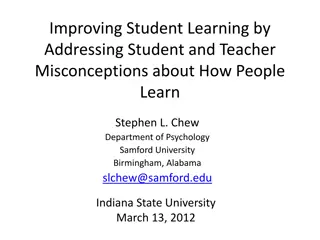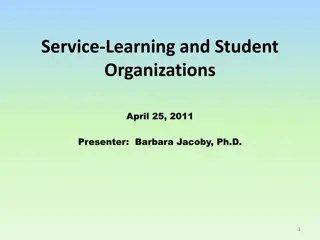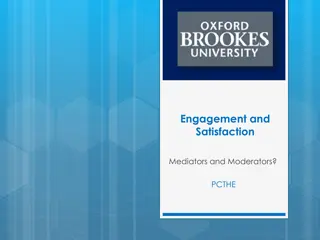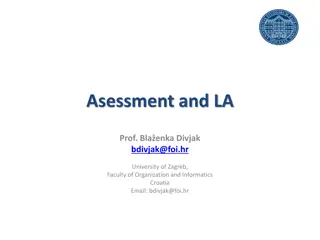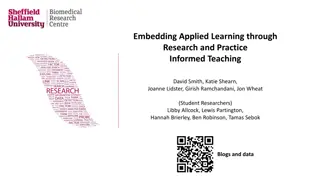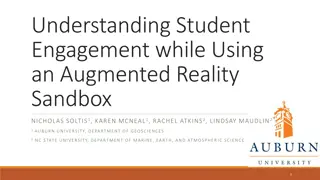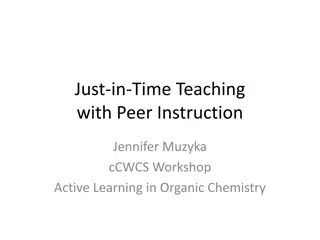Student Engagement in Learning and Teaching Quality Management Research
Effective student representation and engagement in quality management in UK higher education institutions were explored through a research project funded by QAA. The study involved surveys, interviews, and desk-based research, highlighting the importance of student involvement in governance for quality assurance. Findings revealed the evolving relationship between students and institutions, with a focus on partnership and stakeholder roles. Various methods of student representation and engagement were also observed, reflecting a shift towards innovative approaches in student involvement.
Download Presentation

Please find below an Image/Link to download the presentation.
The content on the website is provided AS IS for your information and personal use only. It may not be sold, licensed, or shared on other websites without obtaining consent from the author.If you encounter any issues during the download, it is possible that the publisher has removed the file from their server.
You are allowed to download the files provided on this website for personal or commercial use, subject to the condition that they are used lawfully. All files are the property of their respective owners.
The content on the website is provided AS IS for your information and personal use only. It may not be sold, licensed, or shared on other websites without obtaining consent from the author.
E N D
Presentation Transcript
Student Engagement in Learning and Teaching Quality Management Prof Gwen van der Velden
Outcomes of a QAA funded research project 2013 Co-authors: Prof Geoff Whitty, Prof Rajani Naidoo, Dr Paolo Piementel- Botas, Alex Pool (now Rhys).
Context (UK) Effective student representation by well supported Students Unions is common Student Satisfaction survey has been in place 10+ years and steers interest Sector policy (QAA) expects student engagement in quality management (Code of practice B5)
Research methodology Desk based research and online surveys of UK Higher Education Institutions (HEIs), including large, small, specialist and private institutions, and their students unions. Online survey was sent to institutional staff responsible for quality management in 260 institutions and representation officers and sabbatical officers in 199 students unions. Seventy-five institutions and 26 students unions responded and completed surveys. Telephone interviews of a selected group of institutional staff with oversight of quality management in their institution. Research undertaken during April, May and July 2013.
General findings Student representation is well informed, well organised and developing Student involvement in governance is ubiquitous Quality management relies on student engagement(surveys, reviews, governance and SSLC)
Arnstein, Sherry R. "A Ladder of Citizen Participation," JAIP, Vol. 35, No. 4, July 1969, pp. 216-224.
Conclusions 1 The changing relationship between students and institutions Institutions mostly described students as stakeholders despite the debate in the sector suggesting institutions view students as partners. A third felt students were (also) consumers. In an effort to keep consumerism at least out of the classroom, institutions appeared to have embraced the partnership ethos as an ideal to strive for at discipline and programme level.
Conclusions 2 Alternative methods of representation and engagement Rather than using elected or even selected representational forms supported by a students union or similar, private institutions* included in our survey, veered towards the appointment and employment of recent graduates to take on representative roles within the organisation. * Private institutions in the UK do not have a legal requirement to have a Students Union
Conclusions 3 The role of students unions in institutions is changing Students unions are by and large partners to the institution Institutions recognised that students unions collected data independently to inform and sometimes steer developments within the institution. Institutions are increasingly viewing it as part of their students union s responsibility to find ways of representing hard-to-reach groups effectively.
Conclusions 4 The impact of student voice and engagement The research supported the commonly made assumption that a strong student voice informs in learning and teaching practices and policies The single theme of assessment and feedback was mentioned by almost every institution and students union as a key area of shared interest (but..) Student engagement led considerably more often to enhancement of transactional rather than transformational aspects
Conclusions 5 The influence of the student voice is broadening. The student voice now influences professional services, expressing student interests beyond the student learning experience and in a few cases, overall institutional strategic planning. This pervasive involvement of students was interpreted as a sign of a genuine change in ethos in those institutions.
Conclusions 6 Student charters or similar partnership agreements are widely implemented but have yet to find their relevance to student engagement Both institutions and students unions also expressed concerns about the relevance of a charter in students and staff s day to day practice and whether charters covered all student groups equally and effectively. Both institutions and students unions saw advantages in the process of drafting such statements.
References Cockburn, D. (2005) Report of the higher education mapping exercise of student involvement in quality assurance and enhancement processes. Edinburgh: Student Participation in Quality Scotland. Available: http://www.sparqs.ac.uk/upfiles/Celebration%20Uni%20Summary.pdf HEFCE (2003). Collecting and using student feedback on quality and standards of learning and teaching in Higher Education. HEFCE, Bristol, UK. Available: http://oro.open.ac.uk/11876/4/ Little, B., Locke, W., Scesa, A. and Williams, R. (2009). Report to HEFCE on student engagement. London: Centre For Higher Education Research and Information (CHERI). Available: http://www.open.ac.uk/cheri/documents/student-engagement-report.pdf NUS (2012) A Manifesto for Partnership, NUS London. http://www.nusconnect.org.uk/campaigns/highereducation/partnership/a-manifesto-for- partnerships/ Quality Assurance Agency for Higher Education (2012c) UK Quality Code for Higher Education, Part B: Ensuring and Enhancing Academic Quality, Chapter B5 Student Engagement, Gloucester: QAA http://www.qaa.ac.uk/Publications/InformationAndGuidance/Documents/Quality-Code- Chapter-B5.pdf Van der Velden, G. M. (2012a). Institutional level student engagement and organisational cultures. Higher Education Quarterly, 66(3): 227-247. Van der Velden, G.M (2012b). Student Engagement: Whose education is it anyway? Talking about Quality. Available: http://www.qaa.ac.uk/Publications/InformationAndGuidance/Documents/talking-about- quality-student-engagement.pdf






